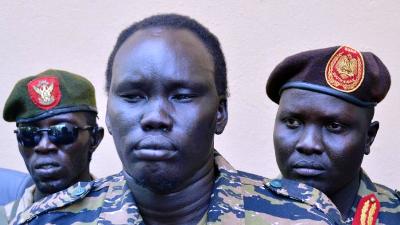South Sudan’s Yauyau disowns Kiir’s SPLM, joins Machar’s SPLM-IO
April 1, 2024 (JUBA) – The former chief of Pibor Administrative Area, David Yau Yau has disowned his membership with the ruling Sudan People’s Liberation Movement (SPLM) under President Salva Kiir, joining the Sudan People’s Liberation Movement-In Opposition (SPLM-IO) led by the country’s First Vice President Riek Machar.
Yau Yau made the declaration at a news conference on April 1, 2024 at the headquarters of SPLM-IO under the leadership of Machar, hailing the armed opposition leader for his patience and for displaying political judgement in the interpretation and handling the affairs of the country since the signing of the peace agreement in 2018.
He attributed his decision to join Machar not just to displaying a leadership and vision aligned with the aspirations of the South Sudanese people but abrogation of his 2014 peace agreement between his Cobra faction and the government of South Sudan.
He explained that the political violence that erupted after the 2010 elections was rooted in the political, social and economic structures of the society and the government of South Sudan.
“I just wanted to let you know that the issues for which he took arms have not been addressed. There was not any transitional justice or any efforts to alleviate the humanitarian situation of the people affected by the war. Today, Greater Pibor Administrative Area remains one of the most impoverished, isolated, and underdeveloped communities in South Sudan with no sense of the government services or infrastructure,” said Yauyau in a declaration Sudan Tribune obtained.
Yauyau lauded Machar’s perseverance under challenging circumstances and commended his dedication to bringing peace and justice to the war-torn nation. His decision to break away from Kiir’s faction has received reactions, with some describing a significant development in the country’s political dynamics.
The decision to join Machar’s faction could potentially boost his group’s influence and broaden its support base ahead of the 2024 elections. some regard him as someone with a considerable following among his age set within his ethnic Murle ethnic group, and his endorsement of the SPLM IO would likely resonate with the aspirations of his constituents.
Analysts have argued that the experience of Yau-Yau as a former chief adds value to the political standing and influence in governance and administrative matters in the area.
“His knowledge and experience of the intricacies of local administration as well as his understanding of the needs and concerns of the Pibor Administrative Area could prove invaluable to Machar’s agenda,” said an analyst.
Others, however, noted that the decision demonstrates the widening appeal and acceptance of the Machar’s leadership across the country and especially among communities at the peripheries, often marginalized and neglected by the center.
Machar expressed his gratitude for Yau Yau’s decision to join his party, emphasizing the importance of inclusive politics and collaboration in promoting peace and stability in the country. He reaffirmed his commitment to actively engaging with diverse voices and incorporating their input into the party’s policies and strategies.
Observers have pointed out that the political landscape in South Sudan remains fluid, with various factions and parties vying for power and influence.
Yau Yau’s decision to align himself with the SPLM IO, alongside his public endorsement of Machar’s leadership, could potentially reshape the political landscape in South Sudan, as well as contribute to ongoing efforts towards lasting peace and reconciliation in the country.
Others interpreted his decision to switch sides from President Kiir’s party to Machar’s SPLM-IO to his frustration with the loss of his membership at the SPLM political bureau, the highest organ of the party as well as a loss of his parliamentary, ministerial, and administrative assignments. His competitors have always replaced him or his local allies, reducing them to competition for political positions meant to represent the area.
(ST)

